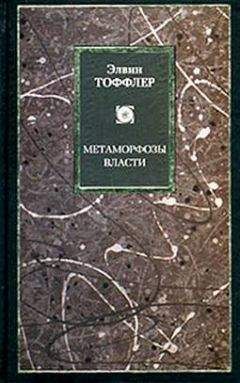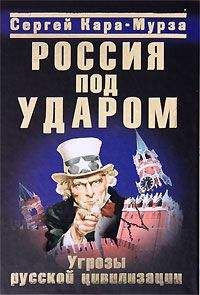Элвин Тоффлер - Метаморфозы власти

Скачивание начинается... Если скачивание не началось автоматически, пожалуйста нажмите на эту ссылку.
Жалоба
Напишите нам, и мы в срочном порядке примем меры.
Описание книги "Метаморфозы власти"
Описание и краткое содержание "Метаморфозы власти" читать бесплатно онлайн.
Перед вами — одна из самых влиятельных работ в жанре так называемой «социальной философии» — «Метаморфозы власти» Элвина Тоффлера. Книга, в которой развитие его оригинальных, ярких идей достигает уже кульминационной точки.
Итак, происходят ли «метаморфозы власти» лишь на глобальном уровне — или, незаметные для нас, давно уже стали частью нашей повседневной, обыденной жизни? И что принесет нам это в грядущем — новые информационные войны и новый политический антагонизм, противостояние уже не между социальными, но между информационными системами?
Двадцать первый век уже настал. Будущее уже наступило. Каким же будет новый облик нашей стремительно — возможно, слишком стремительно, — развивающейся цивилизации?..
[412] Laqueur, Walter. A World of Secrets. (New York: Basic Books, 1985.)
[413] Levchenko, Stanislav. On the Wrong Side. (Washington, D.C.: Pergamon-Brassey's, 1988.)
[414] Lévite, Ariel. Intelligence and Strategic Surprises. (New York: Columbia University Press, 1987.)
[415] Marenches, Count de, and Christine Ockrent. The Evil Empire. (London: Sidgwick and Jackson, 1986.)
[416] Pacepa, Ion. Red Horizons. (London: Hodderand Stoughton. Coronet Books, 1989.)
[417] Perrault, Gilles. The Red Orchestra. (New York: Pocket Books. 1969.)
[418] Phillips, David Atlee. Careers in Secret Operations. (Bethesda, Md.: Stone Trail Press, 1984.)
[419] Pincher, Chapman. Too Secret Too Long. (New York: St. Martin's Press, 1984.)
[420] Plate, Thomas, and Andrea Darvi. Secret Police. (London: Robert Hale, 1981.)
[421] Prouty, Fletcher L. The Secret Team. (Englewood Cliffs, N.J.: Prentice-Hall, 1973.)
[422] Richelson, Jeffrey. American Espionage and the Soviet Target. (New York: Quill, 1987.)
[423]----------. Foreign Intelligence Organizations. (Cambridge, Mass.: Ballinger, 1988.)
[424]----------. The U.S. Intelligence Community. (Cambridge, Mass.: Ballinger, 1985.)
[425] Rositzke, Harry. The KGB. (New York: Doubleday, 1981.)
[426] Seth, Ronald. Secret Servants. (New York: Farrar, Straus and Cudahy, 1957.)
[427] Shevchenko, Arkady N. Breaking with Moscow. (New York: Alfred A. Knopf, 1985.)
[428] Shultz, Richard H., and Roy Godson. Dezinformatsia. (New York: Berkley Books, 1986.)
[429] Suvorov, Viktor. Inside Soviet Military Intelligence. (New York: Berkley Books, 1984.)
[430]-----------. Inside the Aquarium: The Making of a Top Spy. (New York: Berkley Books, 1987.)
[431] Toohey, Brian, and William Pinwill. Oyster. (Port Melbourne, Australia: William Heinemann, 1989.)
[432] Turner, Stansfield. Secrecy and Democracy. (Boston: Houghton Mifflin, 1985.)
[433] West, Nigel. The Circus. (New York: Stein and Day, 1983.)
[434]----------. Games of Intelligence. (London: Weidenfeld and Nicolson, 1989.)
[435] Woodward, Bob. Veil. (New York: Simon&Schuster, 1987.)
[436] Wright, Peter, and Paul Greengrass. Spycatcher. (New York: Viking Press, 1987.)
ЗНАНИЕ И ОБЩЕСТВО
[437] Afanasyev, V. Social Information and the Regulation of Social Development. (Moscow: Progress Publishers, 1978.)
[438] Alisjahbana, S. Takdir. Values As Integrating Forces in Personality, Society and Culture. (Kuala Lumpur: University of Malaya Press, 1966.)
[439] Attali, Jacques. Noise. (Minneapolis: University of Minnesota Press, 1985.)
[440] Bacon, Francis. A Selection of His Works. (Indianapolis: Bobbs-Merrill Educational Publishing, 1965.)
[441] Bok, Sissela. Secrets. (New York: Vintage Books, 1984.)
[442] Cherry, Kittredge. Womansword. (Tokyo: Kodansha International, 1989.)
[443] Cirlot, J. E. A Dictionary of Symbols. (New York: Philosophical Library, 1962.)
[444] Coser, Lewis A. Men of Ideas. (New York: Free Press, 1970.)
[445] Curtis, James E., and John W. Petras, eds. The Sociology of Knowledge. (New York: Praeger, 1970.)
[446] De Huszar, George В., ed. The Intellectuals. (Glencoe, III.: Free Press of Glencoe, 1960.)
[447] Doi, Takeo. The Anatomy of Dependence. (Tokyo: Kodansha International, 1985.)
[448] Duke, Benjamin. The Japanese School. (New York: Praeger, 1986.)
[449] Ekman, Paul. Telling Lies. (New York: W. W. Norton, 1985.)
[450] Everhart, Robert В., ed. The Public School Monopoly. (Cambridge, Mass.: Ballinger, 1982.)
[451] Feigenbaum, Edward, Pamela McCorduck, and H. Penny Nii. The Rise of the Expert Company. (New York: Times Books, 1988.)
[452] Foster, Hal. Postmodern Culture. (London: Pluto Press, 1985.)
[453] Foucault, Michel. Power, Truth, Strategy. (Sydney: Feral Publications, 1979.)
[454] Gardner, Howard. The Mind's New Science. (New York: Basic Books, 1985.)
[455] Gouldner, Alvin W. The Future of Intellectuals and the Rise of the New Class. (New York: Continuum Books, 1979.)
[456] Habermas, Jürgen. Knowledge and Human Interests. (Boston: Beacon Press, 1968.)
[457] Hansen, Robert H. The Why, What and How of Decision Support. (New York: AMA Management Briefing, 1984.)
[458] Hoffman, Lily M. The Politics of Knowledge. (Albany: State University of New York Press, 1989.)
[459] Keren, Michael. Ben Gurion and the Intellectuals. (Dekalb, III.: Northern Illinois University Press, 1983.)
[460] Kindaichi, Haruhiko. The Japanese Language. (Rutland, Vt.: Charles E. Tuttle, 1978.)
[461] Konrad, George. Antipolitics. (New York: Harcourt Brace Jovanovich, 1984.)
[462] Konrad, George, and Ivan Szelenyi. The Intellectuals on the Road to Class Power. (New York: Harcourt Brace Jovanovich, 1976.)
[463] Kraemer, Kenneth L., et al. Datawars. (New York: Columbia University Press, 1987.)
[464] Lakatos, Imre, and Alan Musgrave, eds. Criticism and the Growth of Knowledge. (London: Cambridge University Press, 1979.)
[465] Lamberton, D. M., ed. Economics of Information and Knowledge. (Middlesex, U.K.: Penguin Books, 1971.)
[466] Lyotard, Jean-François. The Post-Modern Condition. (Minneapolis: University of Minnesota Press, 1984.)
[467] Machlup, Fritz. Knowledge: Its Creation, Distribution, and Economic Significance, Vol. I. (Princeton: Princeton University Press, 1980.)
[468]----------. The Production and Distribution of Knowledge in theUnited States. (Princeton: Princeton University Press, 1962.)
[469] Noer, Deliar. Culture, Philosophy and the Future. (Jakarta P. T. Dian Rakyat, 1988.)
[470] Ohmae, Kenichi. The Mind of the Strategist. (New York: Penguin, 1983.)
[471] Ong, Walter J. Orality and Literacy. (London: Methuen 1982.)
[472]----------, ed. Knowledge and the Future of Man. (New York: Clarion Books, 1968.)
[473] Paulos, John Allen. Innumeracy. (New York: Hill and Wang, 1988.)
[474] Popper, K. R. The Open Society and Its Enemies, Vol. I. (London: Routledge and Kegan Paul, 1962.)
[475] Powers, Richard Gid. Secrecy and Power: The Life of J. Edgar Hoover. (New York: Free Press, 1987.)
[476] Scott, D. R. The Cultural Significance of Accounting. (Columbia, Mo.: Lucas Brothers, n.d)
[477] Singer, Kurt. Mirror, Sword and Jewel. (Tokyo: Kodansha International, 1973.)
[478] Sowell, Thomas. Knowledge and Decisions. (New York: Basic Books, 1980.)
[479] Strehlow, T.G.H. Songs of Central Australia. (Sydney: Angus and Rubertson, 1971.)
[480] Swetz, Frank J. Capitalism and Arithmetic. (La Salle, I 11.: Open Court, 1987.)
[481] Taylor, Stanley. Conceptions of Institutions and the Theory of Knowledge. (New Brunswick, N.J.: Transaction, 1989.)
[482] Tefft, Stanton K. Secrecy: A Cross-Cultura! Perspective. (New York: Human Sciences Press, 1980.)
[483] Van den Berg, Jan Hendrik. Medical Power and Medical Ethics. (New York: W. W. Norton, 1978.)
[484] Whitehead, Alfred North. The Function of Reason. ( Boston : Beacon Press, 1958.)
КОМПЬЮТЕРЫ И КОММУНИКАЦИИ[485] Acco, Alain, and Edmond Zuchelli. La peste informatique. (Paris: Éditions Plume, 1989.)
[486] Arnold, Erik, and Ken Guy. Parallel Convergence: National Strategies in Information Technology. (London: Frances Pinter, 1986.)
[487] Ashby, W. Ross. Design for a Brain. (London: Chapman and Hall, 1978.)
[488] Berlin, Isaiah. Against the Current. (New York: Viking Press, 1955.)
[489] Berlo, David K. The Process of Communication. (New York: Holt, Rinehart and Winston, 1960.)
[490] Cherry, Colin. World Communication: Threat or Promise? (London: Wiley-Interscience, 1971.)
[491] Civikly, Jean M. Messages. (New York: Random House, 1974.)
[492] Duncan, Hugh Dalziel. Communication and Social Order. (London: Oxford University Press, 1962.)
[493] Goodman, Danny. The Complete HyperCard Handbook. (New York: Bantam Books, 1987.)
[494] Goulden, Joseph C. Monopoly. (New York: Pocket Books, 1970.)
[495] Hemphill, Charles F., Jr., and Robert D. Hemphill. Security Safeguards for the Computer. (New York: AMA Management Briefing, 1979.)
[496] Johnson, Douglas W. Computer Ethics. (Elgin, I11.: Brethren Press, 1984.)
[497] Kaligo, Al, Lou Baumbach, and Joe Garzinsky. Telecommunications Management: A Practical Approach. (New York: AMA Management Briefing, 1984.)
[498] Kitahara, Yasusada. Information Network System. (London: Heinemann Educational Books, 1983.)
[499] Landau, Robert M. Information Resources Management. (New York: AMA Management Briefing, 1980.)
[500] Levy, Steven. Hackers. (New York: Dell, 1984.)
[501] Marchand, Marie. The Minitel Saga. (Paris: Larousse, 1988.)
[502] McLuhan, Marshall, and Bruce R. Powers. The Global Village. (New York: Oxford University Press, 1989.)
[503] Mortensen, C. David. Communication. (New York: McGraw-Hill, 1972.)
[504] Pool, Ithiel de Sola. Technologies of Freedom. (Cambridge, Mass.: Belknap Press of Harvard University Press, 1983.)
[505] Poppel, Harvey L., and Bernard Goldstein. Information Technology. (New York: McGraw-Hill, 1987.)
[506] Shannon, Claude, and Warren Weaver. The Mathematical Theory of Communication. (Urbana: University of Illinois Press, 1949.)
[507] Smith, Alfred G., ed. Communication and Culture. (New York: Holt, Rinehart and Winston, 1966.)
[508] Spacks, Patricia Meyer. Gossip. (Chicago: University of Chicago Press, 1985.)
[509] Strassman, Paul A. Information Payoff. (New York: Free Press, 1985.)
[510] Tarde, Gabriel. On Communication and Social Influence. (Chicago: University of Chicago Press, 1969.)
[511] Wilcox, A. M., M. G. Slade, and P. A. Ramsdale. Command Control and Communications. (New York: Brassey's Defense Publishers, 1983.)
[512] Wilmot, William W., and John R. Wenburg. Commumcational Involvement: Personal Perspectives. (New York: John Wiley and Sons, 1974.)
[513] Winograd, Terry, and Fernando Flores. Understanding Computers and Cognition. (Reading, Mass.: Addison-Wesley, 1986.)
НАУКА И ТЕХНИКА[514] Colombo, Umberto, et al. Science and Technology Towards the XXI Century and Their Impact Upon Society. (Milan: The Pirelli Group, n.d.)
[515] Drexler, K. Eric. Engines of Creation. (New York: Anchor Press, 1986.)
[516] Dryakhlov, Nikolai. The Scientific and Technological Revolution: Its Rss. Design for a Brain. (London: Chapman and Hall, 1978.)
[517] Illich, Ivan. Tools for Conviviality. (New York: Harper&Row, 1973.)
[518] Langone, John. Superconductivity: The New Alchemy. (Chicago: Contemporary Books, 1989.)
[519] Melvern, Linda, David Hebditch, and Nick Anning. Techno-Bandits. (Boston: Houghton Mifflin, 1984.)
[520] Mendelssohn, Kurt. The Secret of Western Domination. (New York: Praeger, 1976.)
[521] Muroyama, Janet H., and H. Guyford Stever, eds. Globalization of Technology. (Washington, D.C.: National Academy Press, 1988.)
[522] Nicolis, G., and I. Prigogine. Self-Organization in Nonequilibrium Systems. (New York: John Wiley and Sons, 1977.)
[523] Prigogine, Ilya. From Being to Becoming. (San Francisco: W. H. Freeman, 1980.)
[524]----------, and Isabelle Stengers. La nouvelle alliance. (Paris: Éditions Gallimard, 1979.)
[525]----------. Order Out of Chaos. (New York: Bantam Books, 1984.)
[526] Tuck, Jay. High-Tech Espionage. (London: Sidgwick and Jackson, 1986.)
[527] The Scientific-Technological Revolution and the Contradictions of Capitalism. International Theoretical Conference, Moscow, May 21— 23, 1979. (Moscow: Progress Publishers, 1982.)
ИСТОРИЯ И БИОГРАФИИ[528] Allen, Frederick Lewis. The Lords of Creation. (New York: Harper&Brothers, 1935.)
[529] Attali, Jacques. A Man of Influence. (Bethesda, Md.: Adler&Adler, 1987.)
[530] Ayling, S. E. Portraits of Power. (New York: Barnes and Noble, 1963.)
[531] Braudel, Fernand. Afterthoughts on Material Civilization and Capitalism. (Baltimore: Johns Hopkins University Press, 1977.)
[532]-----------. Capitalism and Material Life 1400—1800. (New York: Harper Colophon Books, 1973.)
[533]----------. The Mediterranean. Vol. I. (New York: Harper&Row, 1972.)
Подписывайтесь на наши страницы в социальных сетях.
Будьте в курсе последних книжных новинок, комментируйте, обсуждайте. Мы ждём Вас!
Похожие книги на "Метаморфозы власти"
Книги похожие на "Метаморфозы власти" читать онлайн или скачать бесплатно полные версии.
Мы рекомендуем Вам зарегистрироваться либо войти на сайт под своим именем.
Отзывы о "Элвин Тоффлер - Метаморфозы власти"
Отзывы читателей о книге "Метаморфозы власти", комментарии и мнения людей о произведении.






















